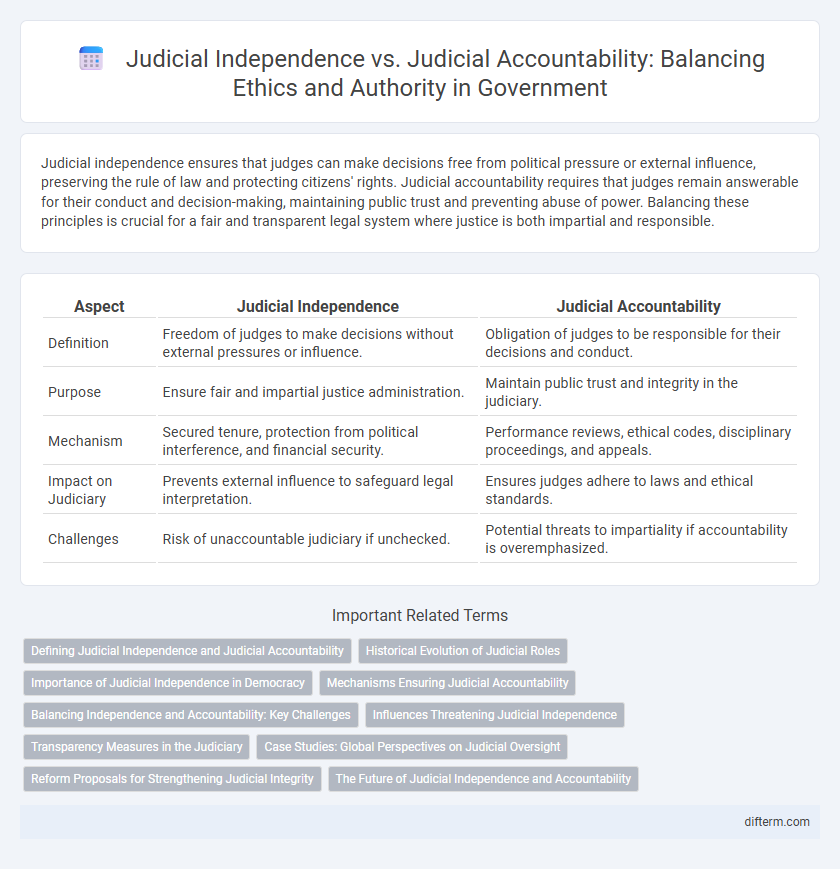Judicial independence ensures that judges can make decisions free from political pressure or external influence, preserving the rule of law and protecting citizens' rights. Judicial accountability requires that judges remain answerable for their conduct and decision-making, maintaining public trust and preventing abuse of power. Balancing these principles is crucial for a fair and transparent legal system where justice is both impartial and responsible.
Table of Comparison
| Aspect | Judicial Independence | Judicial Accountability |
|---|---|---|
| Definition | Freedom of judges to make decisions without external pressures or influence. | Obligation of judges to be responsible for their decisions and conduct. |
| Purpose | Ensure fair and impartial justice administration. | Maintain public trust and integrity in the judiciary. |
| Mechanism | Secured tenure, protection from political interference, and financial security. | Performance reviews, ethical codes, disciplinary proceedings, and appeals. |
| Impact on Judiciary | Prevents external influence to safeguard legal interpretation. | Ensures judges adhere to laws and ethical standards. |
| Challenges | Risk of unaccountable judiciary if unchecked. | Potential threats to impartiality if accountability is overemphasized. |
Defining Judicial Independence and Judicial Accountability
Judicial independence refers to the principle that judges must be free from external pressures, including political influence and public opinion, to make impartial decisions based solely on law and facts. Judicial accountability involves mechanisms that ensure judges uphold ethical standards, follow legal procedures, and maintain transparency, thereby protecting public trust in the judiciary. Defining the balance between judicial independence and accountability is crucial for maintaining the rule of law and safeguarding democratic governance.
Historical Evolution of Judicial Roles
The historical evolution of judicial roles highlights a dynamic balance between judicial independence and accountability, where early common law courts emphasized impartiality to protect rulings from political interference. Over time, reforms introduced mechanisms such as judicial review and public oversight to enhance accountability without compromising the judiciary's ability to act as a check on executive power. This progression reflects the ongoing tension in democratic governance to maintain fair and unbiased adjudication while ensuring judges are responsible to legal and ethical standards.
Importance of Judicial Independence in Democracy
Judicial independence is essential in a democracy as it ensures impartiality and prevents undue influence from the executive and legislative branches. It upholds the rule of law by allowing courts to make decisions based solely on facts and legal principles, protecting citizens' constitutional rights. Maintaining this independence strengthens public trust in the judicial system and supports the separation of powers fundamental to democratic governance.
Mechanisms Ensuring Judicial Accountability
Judicial accountability is maintained through mechanisms such as judicial review, ethical codes, and disciplinary bodies that oversee judges' conduct and ensure adherence to legal standards. Transparent appointment processes and performance evaluations further promote responsibility while safeguarding judicial independence. These measures balance the need for impartial decision-making with the imperative of upholding public trust in the judiciary.
Balancing Independence and Accountability: Key Challenges
Judicial independence ensures fair and impartial decision-making free from external pressures, while judicial accountability maintains transparency and ethical standards within the judiciary. Balancing these principles poses challenges such as preventing undue political influence without compromising the mechanisms that hold judges responsible for misconduct. Effective frameworks incorporate clear oversight bodies and transparent evaluation processes to uphold justice and public trust simultaneously.
Influences Threatening Judicial Independence
Judicial independence faces threats from political pressures, executive interference, and legislative encroachments that compromise impartial decision-making. Influence from interest groups and media sensationalism undermines the judiciary's ability to function without bias or fear of retribution. Judicial accountability mechanisms must be balanced carefully to avoid eroding independence while ensuring integrity and public trust.
Transparency Measures in the Judiciary
Transparency measures in the judiciary enhance public trust by ensuring that judicial processes and decisions are accessible and understandable. Publishing court rulings, financial disclosures, and judicial performance reports supports accountability without compromising judicial independence. These initiatives balance maintaining impartiality with fostering openness, thereby reinforcing the legitimacy of the judicial system.
Case Studies: Global Perspectives on Judicial Oversight
Case studies from global judicial oversight reveal that maintaining judicial independence is crucial to uphold the rule of law, yet judicial accountability ensures transparency and public trust in legal systems. Examples from countries like the United Kingdom illustrate robust oversight mechanisms balancing impartiality with checks against misuse of power, while nations such as India demonstrate evolving frameworks that protect judges' autonomy yet allow for disciplinary actions. Comparative analysis highlights that effective judicial oversight models integrate constitutional safeguards with independent review bodies to harmonize judicial independence and accountability.
Reform Proposals for Strengthening Judicial Integrity
Reform proposals for strengthening judicial integrity emphasize balancing judicial independence with accountability through the establishment of transparent oversight mechanisms and independent judicial commissions. Emphasizing merit-based appointments, regular performance evaluations, and ethical training ensures that judges remain impartial while being answerable to legal standards and public trust. Enhancing procedural safeguards and public reporting fosters greater trust in the judiciary without compromising its autonomy from political interference.
The Future of Judicial Independence and Accountability
Judicial independence remains crucial for maintaining impartiality and upholding the rule of law, ensuring courts can make decisions free from political pressure. Strengthening mechanisms for judicial accountability increases public trust by promoting transparency and ethical conduct without compromising judicial autonomy. Future reforms will likely emphasize balanced frameworks that protect judicial decision-making integrity while enhancing oversight through clear performance standards and independent review bodies.
judicial independence vs judicial accountability Infographic

 difterm.com
difterm.com